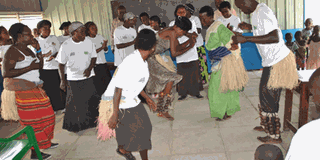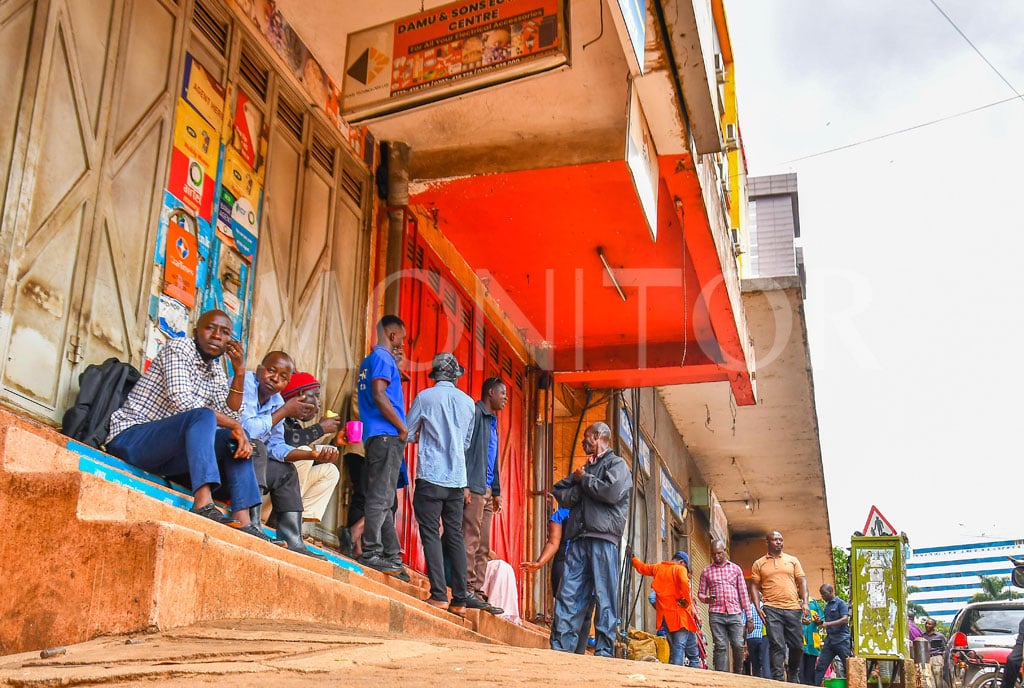Bunyoro: Using dance and drama to relay oil grievances

Kaiso Women’a group dramatise the expected vices that will come from the extraction of oil in bunyoro. Photo by Martin Ssebuyira
What you need to know:
Not all locals are happy about the discovery of oil in the Albertine region- their songs and dance say it all.
The recent oil discoveries in the Albertine Graben were received with great excitement among the population.
Politicians became overzealous to the extent of buying expensive fighter jets from Russia worth Shs1.7trillion that were challenged by opposition politicians.
To many Ugandans, oil means cash. It means wealth beyond anybody’s imagination. It means prosperity although it is difficult for some to tell exactly what they expect from it. Others hope for employment, cheap pump prices, good roads, good health facilities, good schools and free cash handouts from the government once oil begins to flow.
Recent visits at Kaiso Tonya, Sebagoro and Kyehoro landing sites in Buliisa, found the communities with expectations far different from that of people leaving miles away from the oil resources.
The communities, led by women, have formed groups that have since composed songs, poems and plays foretelling the likely impacts of oil mining on the people living near the oil wells.
The groups want to start performing at various national and local functions in different areas sensitising masses on the likely blessing or curse of extracting oil and gas.
“Previously, most of the land used to be community-owned and that is why it was easy for people from other areas to come and settle here. With the coming of oil and the demand for land, the indigenous people (Bagungu) are looking at other immigrants in the area as agents of the land grabbers who want to own it individually,” Evas Birungi, the head of Kaiso Women’s group, says in one of their plays.
“The excitement caused by the government in the host communities on the benefits of oil has made locals feel that the immigrants will reduce their share from the oil resource that has resulted in conflicts between the people inhabiting the shores of Lake Albert.”
Asuman Irumba, the speaker of Abayita clan, says many of their clan members have died, there are severe winds and famine resulting from the destruction of their nine cultural sites by Tullow upon discovering Nsanga I and II oil wells. Besides that, they were barred from going there.
“They never compensated us or set up alternative cultural sites that have since caused massive suffering in the area,” he said.
He says the fisheries department recently impounded illegal fishing gear. When the owners tried to reclaim them from the stores in which they had been locked, the army responded by bringing tanks and armoured cars firing for about 30minutes.
Bitu Nyamazi, a member of Abayita, says social vices such as prostitution, drug abuse, corruption and crime are steadily increasing because of the influx of people to the area.
“They have sidelined us. They sign the agreements in Kampala, ferry equipment and we only see cars and camps being erected leaving us speculating on a number of issues, yet oil belongs to all of us,” she says.
Recent research findings by the National Association of Professional Environmentalists (Nape) on the likely impact of oil and gas activities in the Albertine region showed threats of the gas and oil on the environment if not handled with care.
“The Albertine Rift is one of Africa’s most important sites for the conservation of biodiversity and has been designated by Birdlife International, the World Wildlife Fund and Conservation International as Africa’s biodiversity hotspot.
The discovery of oil is likely to have adverse impacts on wildlife and environment in the short, medium and long term,” the report reads in part.
According to Nape research officer, Allan Kalangi, the affected communities will be supported to air out their views for their betterment.
Uganda recently discovered oil and gas in the oil fields of Mputa, Waraga, Nzizi, Nsanga one , two and Kingfisher.
About 6,000 barrows of oil have since been drilled and containerised awaiting the refinery yet to be set up.
Dozith Abeinomugisha, the acting principal geologist in the Ministry of Energy and Development, says Tullow oil has discovered 12 other oil wells in Kasotonya, Bulisa, two (dry wells) which are going to be relinquished to government.
He says Tullow has also set up infrastructure to be used in the community and has promised employment to over 10,000 locals.
Oil drilling is expected to start in 2015 after setting up an oil refinery in Kabale to produce at least 20,000 barrows of oil per day.
History and Development of Oil & Gas in Uganda
The hunt for oil in Uganda dates back to the early 1920s, when a British geologist named E.J. Wayland documented the presence of hydrocarbons in the Albertine Graben.
This initial discovery was followed by preliminary well-drilling in 1938, but was halted in the wake of World War II and its aftermath. (The most that was done in the 1940s and 50s was the drilling of a few shallow wells for stratographic purposes.)
In the years following independence, the political turmoil that engulfed Uganda rendered the pursuit of oil dormant until the 1980s, when the country acquired aeromagnetic data across the entire Graben region. The aeromagnetic surveys, which were taken between 1983 and 1992, produced a ray of hope. They identified five sedimentary basins in the country, not only in the Albertine Graben, but also in Lake Kyoga, Hoima, Lake Wamala, and Moroto-Kadam. Geologists in Uganda’s Petroleum Exploration and Production Department engaged in extensive subsequent ground surveys, which revealed the Albertine Graben as the basin most primed for oil exploitation.
The Albertine Graben is located in western Uganda, covering the districts of Masindi, Kibale, and Hoima. The Graben, which forms the northernmost part of the western arm of the East African Rift Valley, is situated along the Ugandan-Congolese border, and stretches northward to Uganda’s border with South Sudan.
Over the past decade, the Ugandan government has signed contracts with a number of international companies to engage in preliminary exploration and testing. The most visible of these firms is Tullow Oil, which recently consolidated its hold over a handful of oil-rich concessionary blocks in the Graben.
In March 2011, Tullow signed contracts with Total S.A. of France and CNOOC Ltd. of China, each of which acquired a one-third interest in the exploration areas.
acode-u.org




